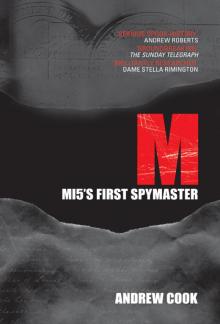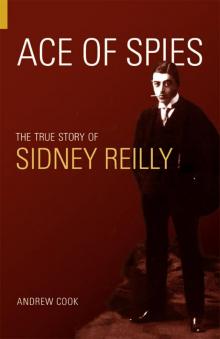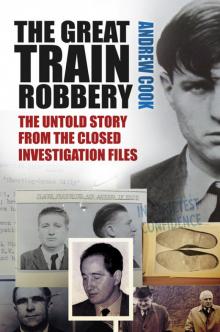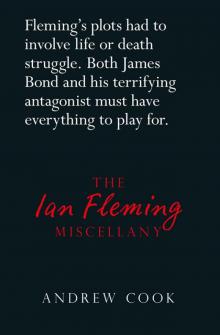- Home
- Andrew Cook
M Page 8
M Read online
Page 8
Thomas Brennan was also wanted for the Phoenix Park murders. Melville was well informed; he knew the names, and where certain Irishmen were hiding out, and he knew who he was looking for. He relentlessly asked questions in French, heard them interpreted, and heard the answers back in English – and made scribbled notes as they were interpreted to him in French. This Groves had sent Walsh some money: £60 in three notes. Melville said he did not believe this story – how could it be in three notes? Walsh asked if he had to produce the notes and –
M. Goron said it was voluntary, but I said quickly that he should show them. On this he drew from a belt worn inside his trousers three £20 Bank of England notes. M. Goron said this was a delicate matter, there being no charge against Walsh. I however snatched the notes hurriedly and found that they were:
1st Serial No. 59/W No.66929. of 17th February 1887. This one was stamped at some office apparently with the figures 5989 and also 8668.
2nd 4/V No.64906 of 20th March 1886.
3rd 4/V No.85348 – ditto
Walsh refused to give any answer as to why Groves sent him the money beyond that he was a friend, and thought, he (Walsh) might want it. He had no acquaintances at Paris but knew a Mr Casey, whom he saw when in custody at Havre in 1883, but did not see him since.11
Melville asked him about a ‘carroty’ fellow in whose company he had been seen (probably McKenna, living in Paris as Sylvester). Walsh told him the carroty man was an American he’d met by accident. And yes, he had met him again yesterday, but said it was by chance.
This pushy French policeman was making him uneasy. He hadn’t walked in expecting a grilling. He would answer no more questions. He demanded reassurance from the Préfet, who had been quietly observing, that none of this information about himself, or the banknotes, would reach the English police.
The silence was broken by Melville: ‘Walsh, man, I am an inspector from Scotland Yard.’
Walsh’s exact response is not recorded but we have it on Monro’s authority that it was ‘more emphatic than reverent’.12 He was allowed to go and McKenna was shadowed – so obviously shadowed that he dared not meet Walsh, but had to go back to his hotel. The two detectives sat down at a restaurant across the street and ordered un verre. After some time McKenna came out. The detectives got up to follow him. McKenna turned around crossly and came back. This he did several times. He was not a happy man. When finally he came out again they waved him over for a drink. He had been worn down; he could not resist. The glasses were on the table and the rounds were being thoughtfully consumed when around the corner who should come but – Walsh. When he saw McKenna sitting with two detectives he sprang to a certain conclusion about the cause of his own predicament. And he said so to McKenna, roundly abusing him. In the stand-up shouting match that followed, the two detectives crept away.
A couple of days later both men were gently escorted to Le Havre by train, Walsh travelling with Melville and McKenna with Sergeant Flood.
The two conspirators were so irate still with one another that they declined to travel in the same carriage. On the way to Havre Walsh attempted to pump Inspector Melville as to the ports which were watched by the Police. Inspector Melville naturally was not lavish in the information given, but he rather implied that there was not a port in the world where Scotland Yard was not strongly represented. On arrival at Havre, many of the employees at the wharves and shipping who knew Melville well owing to his having been formerly stationed at Havre, came forward effusively and greeted him. To Walsh this sight suggested that all these men must be allies of Melville in the police, and his comment, with an oath was ‘There are scores of them.’13
Monro gleefully informed the press that Walsh and McKenna were on their way home from France with their tails between their legs. Someone in America issued a denial that Walsh was in Europe at all; he was in Omaha. At this Monro sent a wire to Pinkertons, suggesting that if any American newsmen cared to see Walsh and his former friend Roger McKenna for themselves they could meet SS Gascogne when she arrived from Le Havre.
Walsh and McKenna were greeted on the NewYork waterfront by about forty news hounds. Walsh was in an abusive mood, and no one was left in much doubt that he had been made to look foolish. ‘Thus the Walsh assassinations scheme was extinguished by the slaughter and ridicule of both England and America’, concluded James Monro, recalling the event with great satisfaction fifteen years later.
Perhaps Sir Charles Warren felt, in the summer of 1888, that his Assistant Commissioner was stealing the limelight. His own standing with the public had never been lower. In November of 1887 he had called out thousands of troops to assist in policing a demonstration in Trafalgar Square; shots were fired and two people killed. The Pall Mall Gazette called it Bloody Sunday. Notwithstanding the roar of protest that greeted his rigid and heavy-handed methods, he threw his weight about more than ever. Henry Matthews, the Home Secretary, could not keep him in check; ‘indeed he took the attitude that the Commissioner once appointed by the Crown had certain powers by statute in the exercise of which he was responsible to no higher official.’14
He was particularly incensed by Monro’s direct line of communication to the Home Office. The long working hours and endless ramifications of the Dynamite Plot had pretty much worn Williamson out, and he had to take sick leave. Monro put forward the name of MacNaghten, an old friend of his from Bengal, to the Home Office, suggesting that he should assist with Williamson’s work under the title of Assistant Chief Constable. The Home Office agreed but Warren ‘blocked the appointment with a mean little whispering campaign.’15 As for Monro, he was summarily removed from the room that the Assistant Commissioner had always occupied at Scotland Yard (‘one of the best in the collection of dog-holes in which the Metropolitan Police have their headquarters’)16 and sent to work alongside Section D at Whitehall Place. This inevitably marginalised the work of the section, besides causing offence to the man on whom rank had so obviously been pulled. ‘The department itself, established in another street, was looked upon somewhat as… a rival rather than a branch of the same business.’17
There were mutinous rumblings throughout the Metropolitan Police generally. Since taking over from Henderson, Warren had expected a militaristic style. Not only did he fail to understand that policemen needed to use their own initiative, but he could not grasp that detectives, to an even greater extent, must be relied upon to take decisions without referring upwards. As the Pall Mall Gazette pointed out, ‘the effect of this was felt throughout the entire force’.
The essential difference between a soldier and a constable is that the former is seldom or never used out of formation, while the latter is seldom or never in formation. That is to say, the soldier is an integral part of a machine, the efficiency of which presupposes the absolute and mechanical obedience of all its parts. The constable, on the contrary, is called upon at all hours to exercise his own judgment, to solve knotty practical questions of law and of fact, to compose disputes, to dispense rough-and-ready justice, and in short to act as an independent unit. For every policeman is the bishop of his beat, with jurisdiction almost like that of a magistrate. If he winks he can suspend the operation of the law. If he pleases he can convert the law into a weapon of oppression. The soldier is never left alone. He never acts on his own initiative. He is always under the eye of his officer, and his supreme quality is unhesitating and unqualified obedience. The constable is always left alone. He is constantly acting on his own initiative, and his supreme duty is the habitual exercise of self-reliance and common sense. Hence militarism is fatal to the force. But with Sir Charles Warren militarism is supreme.18
By mid-August of 1888 Monro had had enough. He resigned, with dignity, in a brief note to Mr Matthews. Sir Charles Warren said nothing to Monro’s men and ‘sinister rumours’, according to Anderson, were circulating about who would take over on 31 August. Robert Anderson was made Assistant Commissioner but ‘for some occult reason’, as Anderson put it in his memoir, ‘th
e matter was kept secret, and I was enjoined not to make my appointment known. I had been in the habit of frequenting Mr Monro’s room as we were working together on political crime matters; but when I did so now, and Sir Charles Warren took advantage of my visit to come over to see me, it was at once inferred that he was spying on me because I was Mr Monro’s friend.’19
Anderson, laden with added responsibility for the ‘ordinary’ CID work on the very day in August when the Jack the Ripper murders began in Whitechapel, was floundering. He was not the sort of man who could withstand Warren at the best of times and with Monro gone, no one else was, either.
The Commissioner had introduced a crowd of yes-men, all of them former soldiers, who saw it as their job to issue orders to the Metropolitan Police. These proved both unpopular and ultimately counter-productive. The height requirement for CID entry was arbitrarily raised to five feet nine inches, as though there were some correlation between height and cunning. Uniformed constables could be fined a stupendous £50 (approaching a year’s pay) for being caught with a glass of beer when on duty. If they exerted their authority and made a mistake they risked being hauled before superior officers and dropping a ‘class’. As it could take eight years to get from one ‘class’ to another and gain a pay increase of twenty per cent, this did not seem a punishment proportionate to the offence.
Melville, in France, was fortunately spared most of this. He could still work autonomously, reporting directly to Littlechild.
In London police morale was low; police officers were entirely demotivated and assertive action by the force, from murder investigation to crowd control, was disastrously affected. So disastrously, in fact, that with the Jack the Ripper killings of September and October the public began to grow restive and the Queen feared ‘that the detective department is not so efficient as it might be’. In October the Pall Mall Gazette printed an article that could only have been inspired by Monro, banished to some Home Office backwater but fighting hard. It demonstrated intimate knowledge of Scotland Yard and was entirely unsympathetic to Warren.
Warren at last resigned on 10 November, the day after the final Ripper murder. There had, according to historical consensus, been five Whitechapel murders between 31 August (the date of Monro’s official departure) and 9 November. During this time Anderson had been occupied with the Parnell Commission as it looked into the truth of the allegations in The Times linking Parnell to the dynamitards. Matthews privately dismissed him as ‘a tout for The Times’.
Monro emerged from his exile at the Home Office. On 24 November, the Cabinet having discussed his candidacy at length, his name was submitted to Queen Victoria who was graciously pleased to appoint him Commissioner.
Anderson was officially, and openly, Assistant Commissioner in charge of CID. With Monro’s guidance in navigating the waters of ‘ordinary’ crime as well as political crime, he got on top of the job.
The Metropolitan Police breathed a collective sigh of relief and the line of communication between the four-man Special Branch, the Assistant Commissioner and the Home Office once again included the Commissioner.
Had it been generally known that the man strongly suspected of being Jack the Ripper had been in police custody in November, but had been allowed, probably by men working for the CID, to escape, there would have been an outcry. Francis Tumblety’s position as chief suspect had been common knowledge in the United States in his lifetime. In England it did not emerge in public for over a hundred years. Even then it came into the light of day only after years of dogged research sparked off by the discovery of a letter from Littlechild.
In 1912, in retirement, the ex-Chief Inspector explained in a private letter to a journalist that Tumblety, a fifty-five-year-old American ‘quack’ doctor who was in London at the time, was very likely the culprit.20 He was a homosexual abortionist and a violent misogynist. He practised what he called ‘Indian medicine’, using herbs and potions and carrying out abortions, all over America. He never stayed in one place for long and always had plenty of money. His appearance was flamboyant and his conversation full of hatred and violence towards women. He used aliases – and decades before at the time of President Lincoln’s assassination by John Wilkes Booth had used the name Booth, which, allied with his general eccentricity, had been enough to get him arrested, briefly. While living in Washington DC during the 1860s he owned an anatomical collection which included wombs he kept in specimen jars.
He had spent time in London before, notably in 1882 when he may have been that ‘Dr Hamilton Williams’ who bought the surgical knives used to kill Lord Frederick Cavendish and Thomas Burke in Phoenix Park. According to a Ripperologist called Nick Warren, ‘Dr Williams’ was a Fenian who had a practice in Demerara, British Guyana, and ‘hung around the capital for several weeks attempting to gain employment with the Irish revolutionaries, only to be refused by them because of his ‘violent language’.21 There are indications that Williams and Tumblety were one and the same.
The pathology departments of two London teaching hospitals had been asked in the months before the Ripper murders for the wombs of women for which the buyer, ‘an American doctor’ would pay a high price. They declined to discuss this with the press, which may indicate that the police had told them to keep quiet because they were already on the trail of the very same American doctor. Tumblety was of Irish extraction and had relations in Liverpool, where he would have disembarked from America. There were almost certainly members of the transatlantic crew who spied for the British – John Patrick Hayes, for instance, one of Jenkinson’s Irish-American informants, was a ship’s engineer.22 There could in other words have been enough of a link to ‘Doctor Williams’ to make Tumblety of more than passing interest to the Sections B and C – the Special Irish Branch and the Port Police – who by 1888 (though not in 1882) were watching the ports for characters just like him. This seems to be confirmed by the Home Secretary’s memo to himself of 22 September: ‘Stimulate the police about Whitechapel murders. Monro might be willing to give a hint to the CID people if necessary.’23
In October Scotland Yard asked the San Francisco police for a sample of Tumblety’s handwriting. In November he was arrested for offences under the 1885 Amendment to the Criminal Law Act, that is, what were then called ‘unnatural’ offences involving men or boys. The New York Times of 19 November wrongly alleged that Tumblety (a well-known character there) had been held on suspicion of complicity in the Whitechapel murders but ‘when proved innocent of that charge was held for trial in the Central Criminal Court’ on these other, less serious charges.
Tumblety hadn’t been found innocent at all and nor had he been held for trial. There was insufficient evidence to charge him with murder and he was granted bail on the Criminal Law Act offences. He promptly skipped the country. As ‘Frank Townsend’ he boarded La Bretagne at Le Havre on 24 November – the very day that Matthews wrote to Her Majesty submitting Monro’s name as Commissioner.
On the evidence, it was cock-up rather than conspiracy. There seem few possible reasons other than incompetence why bail was not more strongly opposed. It later emerged that the two men who stood bail in the sum of £1,500 had known Tumblety for only a couple of days. Tumblety seems to have lived in London in shabby rooms in the East End and to have had only casual acquaintances,24 and if this was the case then the police had no particular reason to think he would be able to put up a large bail or find anyone who could. £1,500 was an enormous sum. Even so, once bail was offered and granted, Tumblety should have been shadowed constantly.
The senior policemen working on the case were CID detectives, not Williamson’s Special Irish Branch men. They were Chief Inspector Swanson at Scotland Yard, who reported to Anderson and, later, Monro; Inspector Moore, the senior man, and Inspectors Abberline and Andrews, in H (Whitechapel) Division; and as many men as could be mustered on the ground. After the trial Tumblety is said to have ‘immediately fled south’. Had he fled north, he would probably have left by railway to Liverpool
for the transatlantic boat. What is certain, though odd, is that around 20 November, twelve extra constables were deployed at Euston and St Pancras Stations in order to examine the belongings of passengers arriving from America.25
He had money and at that date needed no passport, so his fastest escape route was to the South Coast and across the Channel. The Port Police in France could have been telegraphed by way of warning but there are no surviving papers to say that they were. Tumblety got out of England. He took a ferry to Boulogne, travelled to Le Havre apparently unregarded, and embarked for America.
The procedure – as in the case of Walsh above – for getting cooperation from the French police was tortuous and by no means immediate. The Commissioner must send a formal note to the Home Secretary. The Home Secretary must request that the Foreign Office contact the Ambassador in Paris. The Ambassador in Paris would be informed of the gravity of the case in writing from the FO. (In the case of Walsh, the Ambassador had been warned to expect Melville to call; he did not warn his staff, who would not at first allow Melville to see him, and Melville had to get in touch with London again, et cetera, et cetera. So human error could draw out red tape even further.) The Ambassador would contact somebody in the Ministry of Grace and Justice – and in this case, would have to convince him that the man was a Jack L’Eventreur suspect, not just a hounded homosexual. The Minister would speak to the Prefect of Police, the Ambassador would send a wire to Consul Bernal in Le Havre who would speak to M. le Préfet locally, and so it went on. In short, ‘Frank Townsend’ could cross the channel and be on a boat to America while telegrams flew between London and Paris and a Special Branch man gritted his teeth on the dock at Le Havre.

 M
M Ace of Spies
Ace of Spies The Great Train Robbery
The Great Train Robbery The Ian Fleming Miscellany
The Ian Fleming Miscellany